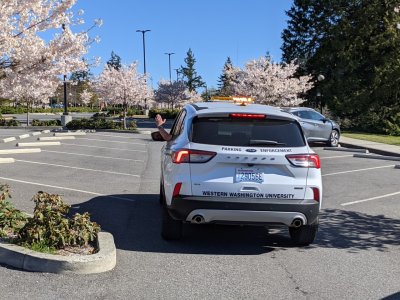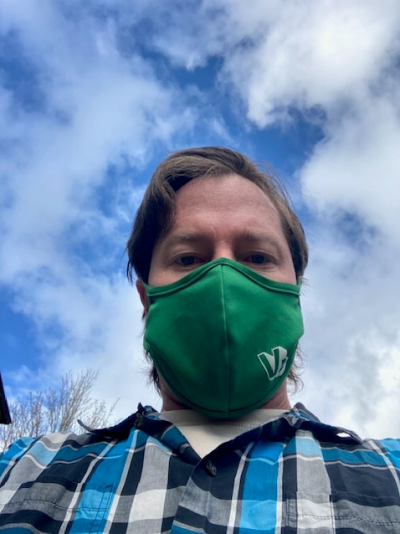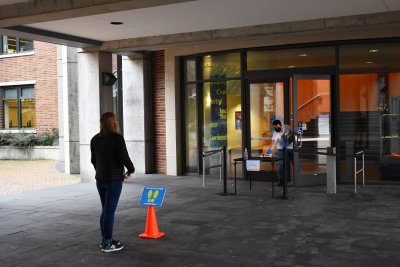Essential@Western - Recognizing WWU Employees Working on Campus
While so many of us have been working from different locations for over a year now, it’s important we try to stay connected despite being apart. Western is collecting photos, short video clips, and stories from critical onsite workers who have been keeping everything going on campus during the pandemic so that we can recognize their dedication and learn more about what their working lives have looked over the past year.
Terri Kempton, Outback Farm Manager, Fairhaven College
“Not all Western students know that we have a farm on campus - but we do! The Outback is a 5-acre organic farm south of the Fairhaven dorms. We grow vegetables, mushrooms, fruit, berries, nuts, and have chickens and bees. The Outback offers year-round experiential farm and homesteading classes and holds workshops and events, like our current speaker series on Food, Farming, Diversity, and Justice. Unlike a lot of the WWU campus, we did not shut down when COVID hit. Our student staff of 8 are considered essential workers and continued growing food and maintaining the farm. We helped create the free food pantry popups to get fresh food to hungry students. We follow strict safety protocols and are excited to slowly welcome back volunteers and folks who want to lean about the food system!
Western's Parking Guides
“Parking Enforcement - Our role on campus seems to have been highlighted since the campus closed in March of 2020 and continues to increase now as we are slowly reopening. We have always focused on helping students, employees, guests, and visitors find and park correctly on campus. As we are an easily recognizable, welcoming, and safe presence for anyone arriving on campus, we have been even more focused on answering questions and assisting everyone we encounter however we can. This work is rewarding for us and we look forward to the day when all the students and our fellow employees return to campus.” - Kevin Jenkins, Pete Elich, and Allan Pack , Parking Guides; Hailey Grainger, Student Parking Monitor.
Bruce Boyer, Environmental Health and Safety
"One of the hats I wear here is as a member of the Confined Space Rescue Team. Whenever there are workers on campus who might go into these spaces we have to be here so, I’ve been on campus throughout. Day to day work has been exciting and stressful as EHS works with others to support the safe presence of people on campus. Constant changes in guidelines and trying to work within them has been a real challenge. People came together from all parts of the campus and a huge amount of energy has been, and continues to be, put in to meeting that challenge. I’m really impressed with what’s been accomplished and how well the university has fared during this time. Wearing a different hat, it’s been very gratifying to be able to provide ergonomic workstation support to people working remotely. People had to deal with such a wide variety of spaces and equipment when many were sent to work from home. If you are one of those people facing challenges in your workspace, on campus or off, please let me help. One more thing- I really miss noon-time workouts at the Rec Center!"
Charles Asher, Interlibrary Loan specialist at Western Libraries
“This is a photo of me working in the library--actually, a photo of me in a book in the library. I have worked various on-site shifts in the library over the past year: providing curbside service, processing interlibrary loan materials, and scanning requested articles and book chapters. Searching for materials in the Northwest Collection of the Wilson 4 Central Reading Room, I spotted the blue spine of a book in which my wife was interviewed as a commercial fisher in Alaska many years ago. I'm in the lower photo (in the water) with my wife Rebecque and my skipper Don, beach seining for salmon on Kodiak Island. One of our holding skiffs in the background is already half-submerged with the weight of fish (photo in book credit: Leslie Leyland Fields). I've thought about whether the metaphor of fishing applies to searching for and pulling library books from the vast pool of volumes at the Western Libraries. It doesn't. Having LC call numbers, well-organized stacks, and a computerized inventory system to locate an item is an infinitely more efficient method of retrieval than setting a 150 fathom net on a lone jumping fish.”
Joanna Bailey, Course Reserves Manager, Western Libraries
“Stacks in the Dark: Once a week I venture into the dark and mostly silent library to retrieve and scan from books to fill course reserves requests. It's faster to navigate stacks without turning on the lights, so I bring my phone and a trusty flashlight, plus nerves of steel for dealing with creepy sounds and shadows that have no obvious explanation. Once I'm done scanning the week's requests I finish processing the PDFs at home, where it's cozy and not at all creepy.”
Luke Mason, maintenance coordinator for Viking Union Operations
“When March 2020 brought the lockdown to Whatcom County and WWU, we all left the Viking Union having no clue what we were in for. The custodial staff and myself were deemed critical and we found ourselves working in a virtually empty building. It was kind of surreal. It was like time just stopped, which gave us the time to stop and think about the time we now have. We accomplished cleaning projects that hadn't happened because we didn't have the time. The custodial staff took the time to complete trainings and gain certifications. We spent a LOT of time figuring out how the Viking Union would open up again. How it would operate, how it would look, how many signs to hang ... Then time passed and we are open to students, staff and faculty in a safe manner and it feels so good! We are creating outdoor seating areas, installing new art and getting creative ideas on what meetings will be like. WWU and Viking Union aside, I hope and feel we ALL will come out of this pandemic in a better space, and time.”
Tim DePoppe, Custodian
“I appreciated the professionalism here at Western at the beginning of and during the pandemic. I felt safe and very grateful to still have a job when so many were unemployed. Thank you to all of the supervisors and staff for keeping Western going during difficult circumstances.”
Kate Farmer, Facilities Manager at Western Libraries
"Empty spaces. I am lucky to be able to come to the library once or twice a month to work. Usually I have the building to myself or maybe a few other library staff are working on other floors that I may see in passing and wave to our talk to from afar. It is very quiet. I come in to distribute PPE supplies or work on projects that support our library staff and building. Usually the library would be very busy on a normal Thursday afternoon when we were open to the public. Campus is quiet too and missing all of the students and staff. It is easy to find parking spaces. I may have to wear a name tag when we all return to work because my coworkers may not recognize me with my long hair and extra 10 pounds!"
Curt Pavia, Learning Technologist at Western Libraries
"Have you used Western Libraries curbside pick-up? If so, then I may have been the one to roam the stacks and pull the book off the shelf for you! I have been committing a few hours a week to be a 'searcher' for the Summit and Curbside pick-up system in place at Western Libraries during the pandemic. Here I am in the iconic Reading Room in Wilson Library, where the Northwest Collection is kept. It is fun to find the various books, although roaming the stacks with practically no one else in the building is eerily quiet. Someday soon, though, eager learners and scholars will be bringing life back into the library; I look forward to that day!"
We want to hear from you!
If you are working on campus now or have been for stretches of the past year, we hope you will consider submitting a short piece of content like the one above about what your pandemic experience has been like on campus to the “Essential @Western” project. It's quick and easy. All of the stories and photos you submit will also be saved in Western Libraries Heritage Resources’ "Telling Our Stories" COVID-19 Documentation Project, and may be shared via Western Today and social media.









